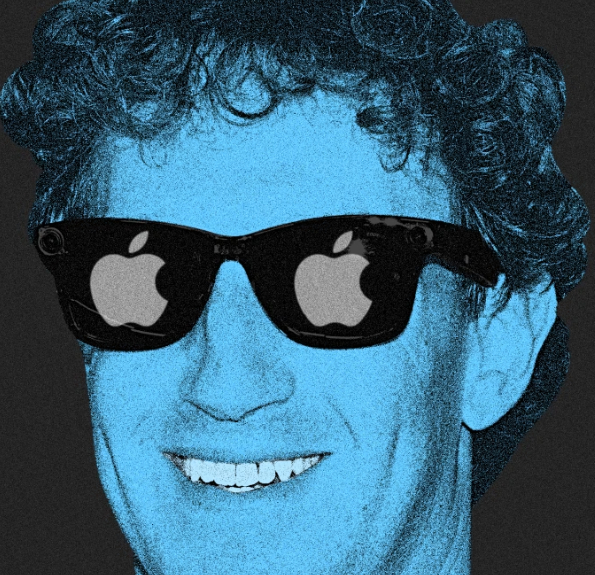
The battle between tech giants continues unabated. When Meta founder Mark Zuckerberg bet hundreds of billions of dollars on "superintelligent AI" and declared smartglasses the next computing platform, Silicon Valley's epic battle escalated once again. Targeting Apple's iPhone as the "gatekeeper of the digital world," Zuckerberg aims to disrupt the existing mobile device landscape with AI-powered smartglasses, ushering in a new chapter in the post-smartphone era.
Zuckerberg's bet on AI is no empty talk. Meta's AI strategy permeates every aspect: from precise advertising algorithms to automated code-writing tools, from custom chips for machine learning efficiency to deep integration with smart hardware. While AI services haven't yet generated significant revenue in the short term, Zuckerberg firmly believes in their long-term value. Take Ray-Ban smart glasses, for example. These AI-powered devices, developed in collaboration with Ray-Ban, have already gained market recognition. Featuring a built-in camera, microphone, and voice assistant, they can translate text in real time, count calories, identify objects, and even integrate ChatGPT-like models, integrating AI capabilities into daily life. More importantly, Meta is developing high-end AI glasses codenamed "Hypernova," priced over 1,000 yuan, targeting Apple's dominance in the consumer electronics market and challenging its technological dominance.
Mark Zuckerberg believes that smartglasses will disrupt the iPhone's "central position." Traditional smartphones rely on touch interaction, while smartglasses, through multimodal interaction such as vision and voice, are more in tune with natural human perception. Meta's hardware design emphasizes lightweight and trendy features. For example, Ray-Ban Stories focuses on fashion and practicality, appealing to a younger audience. Meanwhile, while Apple's Vision Pro boasts advanced technology, its high price limits its mass adoption and has resulted in poor market response. Meta is accelerating the adoption of smartglasses through affordable pricing and an open ecosystem. Counterpoint data shows that the global smartglasses market is expected to grow by 60% year-on-year in 2025, with a compound annual growth rate exceeding 60% over the next five years, indicating that this category will reshape the consumer electronics landscape.
The confrontation between Meta and Apple is essentially a clash of business logic. Apple prioritizes privacy protection, building a high-profit model through a closed ecosystem and a 30% "Apple tax." Meta, however, relies on data-driven advertising, but its core capabilities have been cut off by Apple's AT&T policy, resulting in losses exceeding tens of billions of dollars. Zuckerberg has repeatedly criticized Apple for "user exploitation" and "stagnant innovation," while Cook defends its brand's value of prioritizing privacy. In the field of AI, the divide is even greater: Apple has chosen to partner with OpenAI, strictly adhering to data security, while Meta promotes an open-source model and emphasizes technological openness. This competition reflects two approaches: closed security versus open innovation. The former secures high-end users, while the latter attracts developers and the mass market.
Zuckerberg's vision of "personal superintelligence" aims to break Apple's monopoly on digital access. Smartglasses, as a new platform, seamlessly connect social media, work, and entertainment. Meta, through its Orion device, deeply integrates with its Metaverse strategy to build an interconnected ecosystem. By comparison, while the iPhone remains the market leader, storage controversies and WeChat compatibility issues have exposed its limitations. As user demand for "always-on" intelligent interaction surges, the wearable nature of glasses clearly offers a distinct advantage. The key to success lies in technological implementation and user habits. Meta needs to overcome hardware challenges like battery life and privacy controversies to enhance the practicality of its AI features. Apple, on the other hand, needs to adjust its strategy after the failure of the Vision Pro, balancing innovation with popular demand. Market research shows that smartglasses shipments have surged, but have yet to reach the scale of smartphones. Ultimately, this battle will be decided by consumers: if Meta succeeds in making AI glasses a necessity, Apple's "walled garden" may face a real crisis.
Zuckerberg's "declaration of war" is not just a commercial competition; it's also a gamble on the future of computing. As AI evolves from an auxiliary tool to "superintelligence," can smartglasses replace the iPhone as the new gateway? This battle will reshape the rules of the tech industry, and users will ultimately bear witness—will Apple's closed empire continue, or will Meta's open ecosystem rise to define the next decade of digital life.

On January 4th local time, Trump warned India that if it does not limit its purchase of Russian oil, the United States will continue to raise tariffs on Indian products. Trump's latest warning sent shockwaves through the Indian financial market in just one day.
On January 4th local time, Trump warned India that if it do…
In October 2025, the US trade deficit narrowed unexpectedly…
According to the British media CoinJournal, recently, due t…
In January 2026, US President Trump once again set his sigh…
Europe is facing a crucial strategic choice: In the face of…
On New Year's Day 2026, BMW China announced a "systematic v…